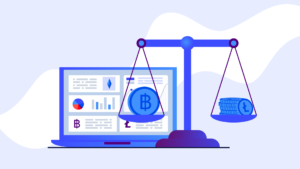
Arbitrage bots have become an essential tool in the Cryptocurrency Trading ecosystem. These automated programs exploit price differences of the same asset across different exchanges to generate profit. However, their legality remains a topic of debate and confusion. In this blog post, we’ll delve into the legal aspects of arbitrage bots, focusing on their development and use in the cryptocurrency market, covering various perspectives, regulations, and ethical considerations to provide a comprehensive understanding.
What are Arbitrage Bots?
Definition and Functionality
Arbitrage bots are automated trading systems designed to take advantage of price discrepancies across various markets or exchanges. They operate by buying an asset at a lower price on one cryptocurrency exchange development and selling it at a higher price on another, often within milliseconds. The rapid execution and high efficiency of these bots make them valuable tools for traders.
Types of Arbitrage Bots
- Spatial Arbitrage Bots- These bots focus on price differences across different exchanges.
- Temporal Arbitrage Bots- These bots exploit price differences over time within the same exchange.
- Triangular Arbitrage Bots- These bots take advantage of discrepancies within a single exchange among three different trading pairs.
Legal Status of Arbitrage Bots
Global Regulatory Landscape
The legality of Crypto Arbitrage Bots varies widely across jurisdictions. Here, we’ll examine the regulatory stance in several major regions:
- United States- The U.S. Securities and Exchange Commission (SEC) and the Commodity Futures Trading Commission (CFTC) have stringent regulations regarding automated trading. While arbitrage itself is not illegal, the use of bots must comply with market manipulation laws.
- European Union- The European Securities and Markets Authority (ESMA) provides guidelines for automated trading. Arbitrage bots are generally legal, provided they adhere to regulations designed to ensure market fairness and integrity.
- Asia-Countries like Japan and Singapore have embraced cryptocurrency trading with clear regulations, where arbitrage bots are permitted but must follow financial regulations.
- Other Regions- In less regulated markets, the legality of arbitrage bots is often less clear, leading to a gray area where traders must proceed with caution.
Ethical Considerations
- Market Manipulation- Arbitrage bots can sometimes border on market manipulation, especially when their activities lead to significant price changes. Regulators are concerned about bots that create artificial price movements, as this can undermine market integrity.
- Fairness and Equality- The use of arbitrage bots raises questions about fairness. These bots give an edge to those who can afford sophisticated technology, potentially disadvantaging smaller traders who cannot compete with high-speed automated systems. However, emerging AI-driven crypto trading agents are making such technologies more accessible, helping level the playing field for a broader range of market participants.
Development of Arbitrage Bots
Key Components
- Algorithm Design- The core of any Crypto Arbitrage Bots is its algorithm. This involves creating a set of rules for identifying arbitrage opportunities and executing trades.
- Data Feeds- Real-time data from multiple exchanges is crucial. Reliable data feeds ensure that the bot can react swiftly to market changes.
- Execution Speed- Speed is paramount in arbitrage trading. Bots must execute trades in milliseconds to capitalize on fleeting opportunities.
- Security- Robust security measures are essential to protect the bot from hacking attempts and ensure the safety of funds.
Challenges in Development
- Latency Issues- Even slight delays in data processing and trade execution can erode potential profits.
- Regulatory Compliance- Developers must ensure that their bots comply with all relevant regulations, which can vary significantly by jurisdiction.
- Market Risks- Arbitrage opportunities are not guaranteed and can disappear quickly, leading to potential losses.
Benefits of Arbitrage Bots
- Profit Potential- Arbitrage bots can generate consistent profits by taking advantage of price inefficiencies, making them attractive tools for traders.
- Market Efficiency- By arbitraging price differences, these bots contribute to market efficiency, helping to align prices across different exchanges and reducing discrepancies.
- Automation and Scalability- Arbitrage bots can operate 24/7 without human intervention, allowing for continuous trading and scalability.
Risks and Drawbacks
- Technological Risks- Bots are susceptible to technical glitches, which can lead to significant financial losses if not properly managed.
- Market Risks- Rapid changes in market conditions can render arbitrage opportunities obsolete, leading to potential losses.
- Regulatory Risks- Operating in different jurisdictions requires careful navigation of varying regulations to avoid legal repercussions.
Best Practices for Arbitrage Bots Development
- Regulatory Compliance- Ensure that your bot complies with all relevant regulations in the jurisdictions where it operates. This includes understanding market manipulation laws and automated trading guidelines.
- Risk Management- Implement robust risk management strategies to mitigate potential losses from technical glitches or rapid market changes. Arbitrage Bots in DEXs can play a crucial role in managing risks by leveraging price discrepancies across decentralized exchanges.
- Continuous Monitoring and Optimization- Regularly monitor the performance of your bot and make necessary adjustments to optimize its performance and ensure compliance with evolving regulations.
Future of Arbitrage Bots
- Technological Advancements- Advances in technology, such as AI and machine learning, are likely to enhance the capabilities of arbitrage bots, making them more efficient and adaptable.
- Regulatory Evolution- As the cryptocurrency market matures, regulations will continue to evolve. Staying abreast of these changes will be crucial for the legal operation of arbitrage bots.






